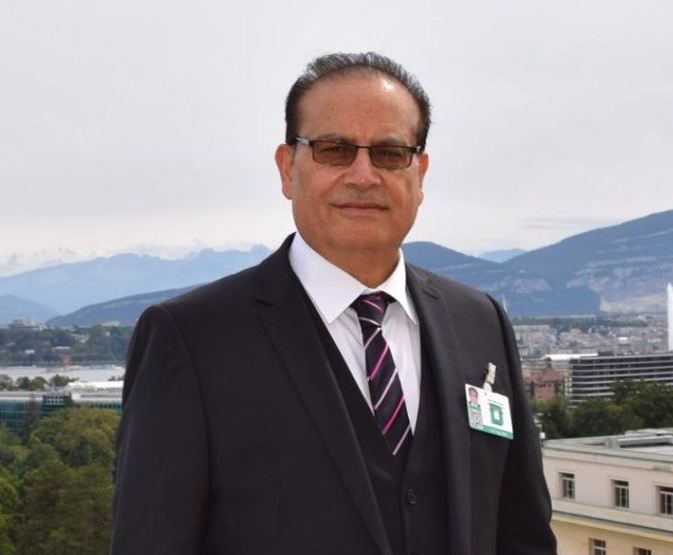Qamar Bashir
Press Secretary to the President (Rtd) | Former Press Minister at Embassy of Pakistan to France | Former MD, SRBC
The escalating threat of terrorism and extremism is deeply troubling, especially given the mounting toll on the lives of our courageous soldiers. This concerning trend has been particularly pronounced since 2021, aligning with the Taliban’s resurgence in Afghanistan. It’s important to note that while global terrorism incidents have been decreasing since 2007, the situation in our region has taken a disconcerting turn.
In the year 2023, Pakistan found itself ranked 4th on the Global Terrorism Index with a score of 8.11. This ranking represented a two-notch increase from 2022 when the score stood at 8.4 out of 10, placing Pakistan as the sixth most terrorism-affected country in the world. During 2022 in Pakistan, there were 648 recorded terrorist attacks, resulting in 1,058 fatalities, 602 injuries, and 13 hostages. The economic toll of terrorism in Pakistan was estimated at a staggering $10.6 billion for the year 2022. This figure is nearly nine times higher than the terrorism-related deaths in 2020, a concerning contrast even when compared to Afghanistan, where terrorism incidents dropped by 75%, and fatalities decreased by 58%.
The Western world, including the USA, has witnessed a consistent decrease in the number of terrorist attacks since 2017. In the west, for instance, only forty attacks were recorded in 2022, representing a significant 27% decrease compared to the 55 attacks reported in 2021.
The Global Terrorism Index reports 130 terrorist attacks originating from Afghanistan into Pakistan during 2022. Among these attacks, the Tehrik-i-Taliban Pakistan (TTP) emerged as the most active terrorist group, responsible for 63 incidents. Other groups contributing to the attacks include the Islamic State Khorasan Province (ISKP), the Balochistan Liberation Army (BLA), and the Jamaat-ul-Ahrar (JuA).
Of great concern is the troubling ratio of security personnel martyred versus terrorists killed. According to the Global Terrorism Index (GTI) for 2023, the global average of terrorists killed per security personnel killed in 2022 stood at 1.19. This signifies that for every security personnel lost, an average of 1.19 terrorists were neutralized. In Pakistan, however, the average ratio in 2022 was notably lower, at 0.67. This implies that for every security personnel lost, only 0.67 terrorists were eliminated.
The high rate of casualties among security personnel compared to terrorists killed has profound implications for the nation. It jeopardizes security and stability, creating an atmosphere of fear and uncertainty that can deter economic development, foreign investment, and social cohesion. Moreover, it has a psychological impact on the population, eroding trust in the government’s ability to provide safety and security, which, in turn, can undermine the overall well-being of the nation.
For the armed forces, continuous and high casualties pose operational challenges and strain their ability to counter terrorist threats effectively. Beyond the strategic implications, it takes a toll on the morale and motivation of military personnel. Witnessing a significant number of colleagues fall in the line of duty can be demoralizing and affect their commitment and readiness.
The families of martyred security personnel bear an immeasurable emotional burden. They endure the grief and loss of loved ones who made the ultimate sacrifice for the nation. The economic hardship resulting from the loss of a breadwinner and the long-lasting psychological trauma further compound their suffering.
The perception of a nation facing a high level of security risks can deter tourists. An unstable security situation can result in travel advisories and warnings, causing a decline in tourism. The negative impact on tourism can lead to a loss of revenue, jobs, and opportunities for local businesses.
A security situation in a country may erode investor confidence, leading to a reluctance to commit capital to the country. As a result, potential investments may be delayed or redirected to more stable regions.
High security risks may deter foreign businesses from engaging in trade partnerships with Pakistani companies, affecting the flow of goods and potentially impacting the country’s trade balance. It may also affect the willingness of companies to establish or expand their operations in Pakistan. This, in turn, could impede economic growth and job creation.
Regrettably, in Pakistan, there exists a prevalent perception that the sole responsibility for countering terrorism rests upon the shoulders of the armed forces.
Adding to this issue, the armed forces, weary of relentless political disputes and unwarranted attempts by various political factions to co-opt their support, have come to believe that political forces may not possess the requisite competence to handle sensitive or critical responsibilities.
This predicament has inadvertently pushed the armed forces into domains such as politics, internal law and order, and even diplomatic matters.
The need of the hour is for politicians, intellectuals, opinion-makers, and celebrities to transcend their parochial political rivalries and demonstrate a genuine commitment to addressing critical issues that threaten the very existence of our nation.
They must embrace the responsibilities vested in them by the constitution and laws of our land and release the armed forces from duties that have been shouldered due to political incompetence, incapacity, and inertia.
It is incumbent on the politician and civil society to begin by comprehending the underlying causes of both domestic and cross-border terrorism followed by devising a comprehensive national strategy to effectively tackle and counteract the primary factors that fuel domestic and cross border forms of terrorism, with the ultimate goal of minimizing the casualties suffered by our security personnel and innocent civilians.
Unifying all political parties in the fight against domestic and cross-border terrorism is a formidable task but an imperative one. National security dialogues must be initiated, providing a platform for representatives from diverse parties to engage in regular discussions centered on the shared objective of countering terrorism.
Bipartisan oversight committees within the legislature can play a critical role in monitoring and evaluating the government’s counterterrorism efforts, ensuring transparency and accountability in policy making.
Cross-party conferences and workshops should facilitate dialogue among political leaders from different spectrums, encouraging an open exchange of ideas and experiences regarding counterterrorism strategies and challenges.
The media’s role in raising public awareness about the necessity of a unified stance against terrorism cannot be overstated. Engaging political parties in policy formulation and promoting transparency through regular briefings build trust and consensus.
Political parties should be urged to prioritize national security over partisan interests, emphasizing the collective threat that terrorism poses. Joint statements and declarations condemning terrorism and a commitment to combating it can send a powerful message.
Crisis management protocols that involve political parties ensure swift coordination during critical situations. Ultimately, unity against terrorism necessitates a long-term commitment, recognizing that the fight against terrorism is an enduring effort that demands sustained cooperation among political parties.
In this regard, bringing together the government, political, civil society, intellectuals, opinion makers, artists, celebrities, and religious figures to address domestic terrorism’s root causes and security concerns is a formidable but essential endeavor.
This can be achieved through the establishment of a National Task Force, comprising diverse representatives, entrusted with a comprehensive mandate to tackle this pressing issue.
Armed forces should also take a deeper look into the reasons and causes of high numbers of martyrdom of brave security personnel during counter terrorism operations and should set in place a comprehensive mechanism to minimize casualties.
First and foremost, an unrelenting focus on advanced training and skill development is essential. Specialized training in counterterrorism tactics, intelligence gathering, and urban warfare is pivotal to equipping security personnel with the tools they need to succeed. Promoting special forces training further enhances precision and minimizes collateral damage during operations.
The effectiveness of these agencies also hinges on improved intelligence sharing and coordination. A seamless partnership between law enforcement, military units, and intelligence agencies, bolstered by international cooperation, is paramount.
Embracing technological advancements, such as surveillance drones, night-vision equipment, and artificial intelligence, is key to gaining a tactical advantage and thwarting threats.
Simultaneously, community engagement strategies that foster trust and collaboration with local populations and the development of community policing programs strengthen the security apparatus.
International collaboration and public support are also integral components of this multifaceted approach. Together, these measures work in concert to create a safer environment, strengthen community trust, and ensure the safety of both security personnel and civilians.
In conclusion, the urgent need to achieve a unified stand by all political parties to counter domestic and cross-border terrorism cannot be overstated. The pressing challenge lies not only in addressing the shared threat of terrorism but also in minimizing the tragic casualties suffered by our dedicated armed forces.
It demands a steadfast commitment to national security, transparency, and prioritizing the well-being of citizens over partisan interests. Building consensus among diverse political leaders is not just a political imperative; it is a moral obligation in the relentless battle against the scourge of terrorism.
In the face of this common and immediate threat, a united front is not only our best defense; it is our resolute stand for the safety, security, and unity of the entire nation, while safeguarding the lives of those who protect us.












